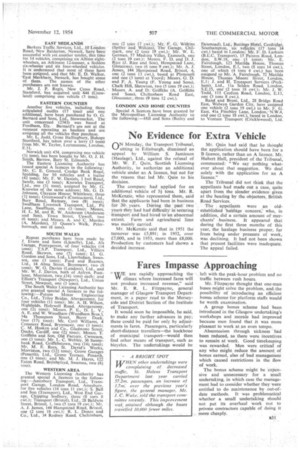Fares Impasse Approaching
Page 65

If you've noticed an error in this article please click here to report it so we can fix it.
I are rapidly approaching the WEclimax where increased fares will not produce increased revenue," said Mr. E. R. L. Fitzpayne, general manager of Glasgow Transport Department, in a paper read to the Merseyside and District Section of the Institute of Transport.
It would soon be impossible, he said, to make any further advances in pay; these could be paid for only by adjustments in fares. Passengers, particularly short-distance travellers—the backbone of municipal transport—would then find other means of transport, such as bicycles. The undertakings would be left with the peak-hour problem and no traffic between rush hours.
Mr. Fitzpayne thought that one-man buses might solve the problem, and, the possibility of introducing an efficient bonus scheme for platform staffs would be worth examination.
A group bonus scheme had been introduced in the Glasgow undertaking's workshops and morale had improved because men found that it was more pleasant to work at an even tempo.
Absenteeism through sickness had been reduced, as there were incentives to remain at work. Good timekeeping was rewarded. Men were critical of any who might reduce the amount of bonus earned, also of bad management which caused restrictions in the flow of work.
The bonus scheme might be expensive and unnecessary for a small undertaking, in which case the management had to consider whether they were entitled to do maintenance by out-ofdate methods. It was problematical whether a small undertaking should not put its overhaul work out to private contractors capable a doing it more cheaply.




































































































